Success in Supply Chain and Procurement Certification
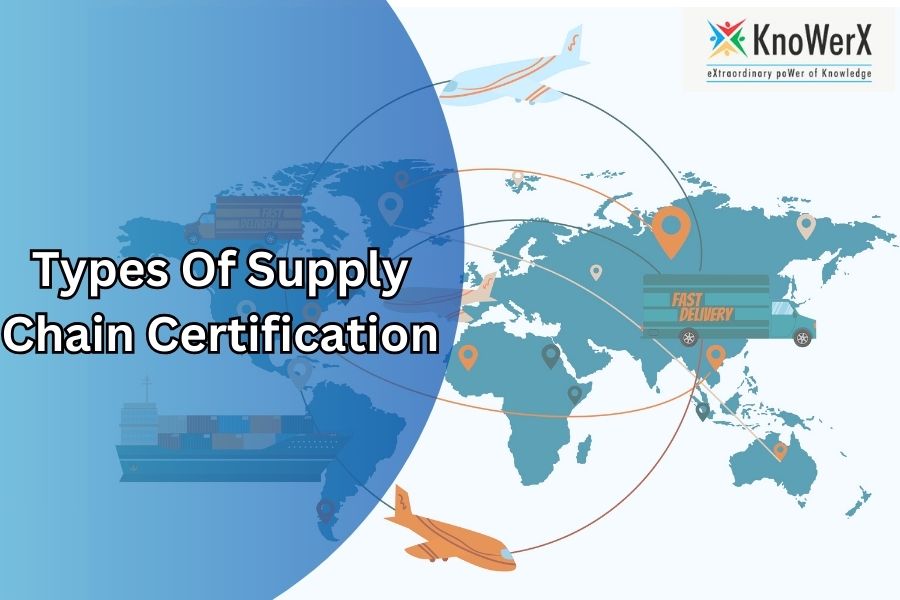
Tips for Achieving Success in Supply Chain and Procurement Certification In today’s competitive business environment, obtaining a supply chain and procurement certification is a strategic step towards advancing your career and enhancing your professional expertise. At KnoWerX, a renowned industry leader in supply chain management training, we are committed to empowering professionals like you with the skills and knowledge needed to succeed. With over 75 years of collective experience in education and consultancy, our experts have honed their expertise through working with large companies in India and abroad. Here are essential tips to guide you towards success in obtaining your supply chain and procurement certification: Master Core Concepts: Before embarking on your supply chain and procurement certification journey, it’s crucial to grasp foundational concepts such as inventory management, logistics, sourcing strategies, and supplier relationship management. A strong understanding of these principles will lay a solid groundwork for your certification preparation. Select the Ideal Certification The world of supply chain and procurement offers a variety of certifications tailored to different career paths and levels of experience. Research and select a certification that aligns with your career goals and interests. Consider pursuing well-recognized certifications like Certified in Planning and Inventory Management (CPIM), Certified Supply Chain Professional (CSCP), or Certified in Transformation for Supply Chain (CTSC) based on your aspirations. Invest in Premier Training Enroll in a reputable supply chain and procurement certification training program, such as those offered by KnoWerX. Our comprehensive courses are designed and delivered by industry experts with decades of experience, ensuring you receive high-quality education and preparation for certification exams. Stay Abreast of Industry Trends Supply chain and procurement practices evolve rapidly with advancements in technology and global market changes. Stay informed about current trends, emerging technologies, and best practices through industry publications, webinars, and conferences. Continuous learning will enhance your expertise and readiness for certification. Gain Practical Experience: Theory alone is not sufficient for mastering supply chain and procurement. Seek opportunities to apply your knowledge in real-world scenarios. Consider internships, project assignments, or volunteering roles to gain practical experience and deepen your understanding of supply chain operations. Network and Collaborate Building a professional network within the supply chain and procurement community can be invaluable for your career growth. Attend industry events, join professional associations, and engage with peers and mentors. Networking can open doors to opportunities, insights, and collaborations. Prepare Thoroughly for Exams Certification exams can be rigorous and demanding. Allocate dedicated time for exam preparation, utilize study materials provided by KnoWerX, and take advantage of practice exams to assess your readiness. Familiarize yourself with exam formats and focus areas to optimize your study efforts. Emphasize Soft Skills Effective supply chain and procurement professionals possess not only technical expertise but also essential soft skills. Communication, negotiation, problem-solving, and relationship-building skills are critical for success in this field. Develop and showcase these skills alongside your certification. Seek Mentorship Identify experienced professionals in supply chain and procurement who can serve as mentors. A mentor can provide valuable guidance, share insights from their own experiences, and offer support throughout your certification journey and beyond. Commit to Continuous Development Obtaining a supply chain and procurement certification is a milestone, but it’s just the beginning of your professional journey. Stay committed to lifelong learning and professional development. Explore advanced certifications, attend workshops, and stay updated with industry advancements to remain competitive and relevant. Frequently Asked Questions Q: Why is obtaining a supply chain and procurement certification important in today’s business environment? A: Obtaining a supply chain and procurement certification is important as it demonstrates your commitment to advancing your career and enhancing your professional expertise in a competitive business environment. Q: How can I select the ideal supply chain and procurement certification for my career goals? A: Research and select a certification that aligns with your career goals and interests. Consider certifications like CPIM, CSCP, or CTSC based on your aspirations and the level of expertise you wish to achieve. Q: How can networking benefit my career in supply chain and procurement? A: Building a professional network within the supply chain and procurement community can open doors to opportunities, insights, and collaborations, enhancing your career growth and professional development. End Notes By following these tips and leveraging KnoWerX’s expertise in supply chain and procurement certification training, you can accelerate your career growth, expand your opportunities, and contribute effectively to organizational success. Our goal is to equip you with the skills and confidence needed to excel in the dynamic and ever-evolving world of supply chain management. Contact KnoWerX today to learn more about our training programs and start your journey towards achieving excellence in supply chain and procurement certification. Unlock your potential and elevate your career with us! Image Reference: Freepik Disclaimer: All trademarks, logos, and brand names are the property of their respective owners. All company, product, and service names used in this website are for identification purposes only. Use of these names, trademarks, and brands does not imply endorsement.
Material Management Certification Courses: Essential Tips
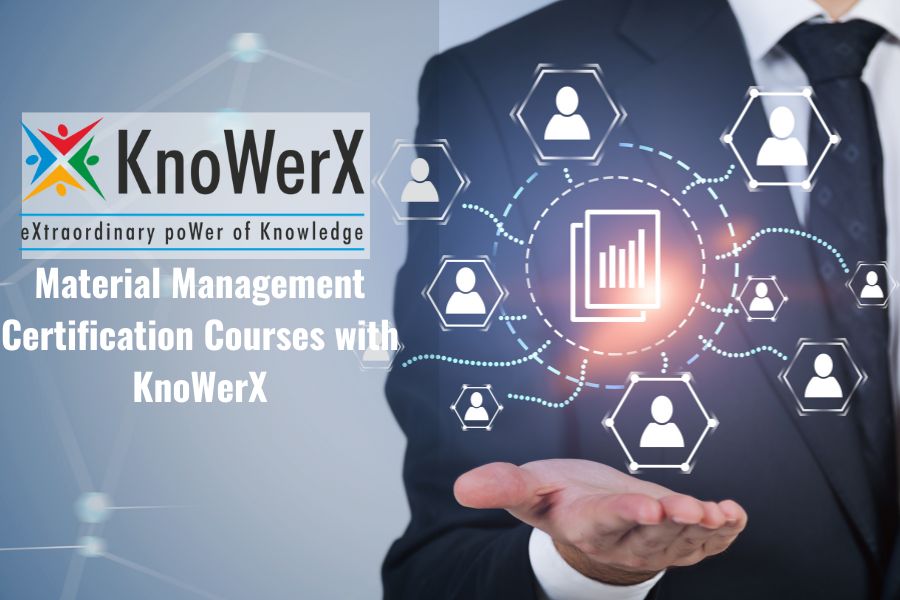
Unveil Your Potential in Supply Chain Management with KnoWerX’s Material Management Certification Courses The world of supply chain relies on a critical process: material management. It’s all about getting the right materials, at the right time, for the right price. Effective material management saves money, boosts efficiency, and helps businesses succeed. Want to advance your career in the supply chain? Having the right knowledge and skills can make a big difference. Here at KnoWerX, a leader in supply chain training, we offer a variety of material management certification courses to help you achieve your goals. Why Get Certified in Material Management? The supply chain industry needs skilled professionals. Earning a material management certification shows employers you’re an expert and sets you apart from the competition. It proves you’re serious about your career and understand the important principles of material management. Choosing the Right Course Can Be Confusing There are many material management certification courses available, so picking the right one is important. Here at KnoWerX, with over 32 years of experience, we’ve helped countless professionals in India and around the world. We partner with leading companies to develop the best courses, all at an affordable price. Here’s what to consider when choosing a material management certification course: Match Your Goals: Are you new to the field and want a basic understanding? Do you have experience but want to specialize in a specific area, like inventory control? Different courses cater to different needs. Think about your career goals and choose a course that helps you get there. Look for a Reputable Certification: The organization offering the certification matters. Choose a course from a well-respected organization in the supply chain field. Make sure the certification is valued by employers in your industry. Content and Learning Style: The course content should be relevant to your goals. Look for a course that covers important topics like: How to find and manage suppliers Inventory management techniques Forecasting and demand planning Warehouse operations and logistics Cost control methods Consider how you learn best. KnoWerX offers a variety of learning formats, including: Instructor-led Programs: Learn From Experienced Professionals Who Share Real-world Knowledge. Online Learning: Study at Your Own Pace and Convenience. Blended Learning: Combine Instructor-led Sessions With Online Learning for a Well-rounded Experience. Why Choose KnoWerX? KnoWerX’s Certified Direct Material Planner (CDMP) Program is the perfect choice for your material management certification course because: Unmatched Expertise: Our instructors are industry veterans with real-world experience who are passionate about teaching. Variety of Courses: We offer a wide range of courses to fit your experience level and career goals. Practical Skills: We go beyond theory and teach you how to use material management concepts in real-world situations. Up-to-Date Knowledge: Our courses are constantly updated with the latest industry trends and best practices. Invest in Your Future A material management certification course is an investment in your professional future. It shows you are committed to learning and makes you stand out from the crowd. With a recognized certification, you’ll be well on your way to leadership roles and higher salaries in the supply chain field. FAQs: Frequently Asked Questions Q1. Why should I get certified in material management? Certification in material management demonstrates expertise to employers, enhancing job prospects and setting you apart in the competitive supply chain industry. It signifies a commitment to career advancement and understanding of crucial material management principles. Q2. What are the benefits of investing in a material management certification course? Investing in a material management certification course demonstrates a commitment to professional development, enhancing career prospects and potentially leading to leadership roles and higher salaries within the supply chain field. Certification validates your skills and knowledge, empowering you to excel in the dynamic world of supply chain management. Q3. Why should I choose KnoWerX’s Certified Direct Material Planner (CDMP) Certification Course? KnoWerX’s CDMP Certification Course stands out due to its expert instructors, comprehensive range of courses, emphasis on practical skills, and commitment to providing up-to-date industry knowledge. With KnoWerX, learners can gain the necessary knowledge and skills to thrive in material management within the supply chain industry. End Notes Empower yourself with KnoWerX’s Certified Direct Material Planner (CDMP) Certification Course, a premier program in material management. With our expert instructors and high-quality education, you will gain the knowledge and skills needed to excel in the dynamic world of supply chain management Image Reference: Freepik Disclaimer: All trademarks, logos, and brand names are the property of their respective owners. All company, product, and service names used in this website are for identification purposes only. Use of these names, trademarks, and brands does not imply endorsement.
Explore the Types of Six Sigma Certification
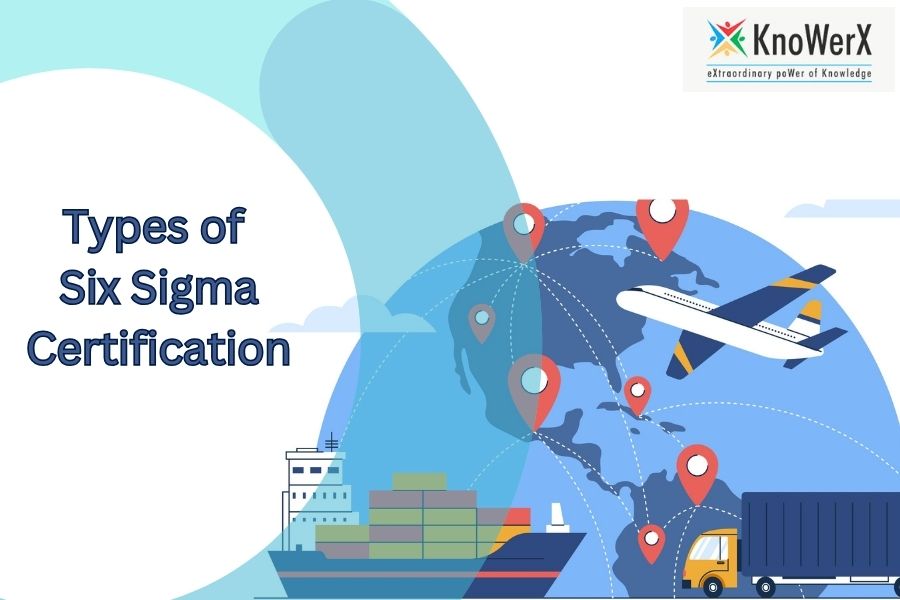
Choosing the Right Six Sigma Certification for Your Career Growth In today’s competitive business landscape, proficiency in process improvement methodologies like Six Sigma certification training is increasingly valued by organizations seeking to optimize efficiency and quality. Six Sigma certifications empower professionals with the knowledge and skills necessary to lead and contribute to impactful improvement projects. However, with various types of Six Sigma certification levels available, choosing the right Six Sigma certification can significantly impact your career trajectory and ability to drive positive change within your organization. Lean Six Sigma Yellow Belt Certification The Lean Six Sigma Yellow Belt certification serves as an entry-level credential ideal for team members actively engaged in process improvement initiatives. This program provides a basic understanding of Lean Six Sigma concepts, tools, and terminology. Participants will develop an awareness of improvement methodologies, gain experience in participating within project teams, and provide support for Green and Black Belt projects. Lean Six Sigma Green Belt Certification This certification is tailored for professionals aiming to lead small to medium-scale process improvement projects within their departments or organizations. The curriculum of the Lean Six Sigma Green Belt program encompasses foundational Lean Six Sigma principles and the DMAIC methodology (Define, Measure, Analyze, Improve, Control). Participants acquire essential statistical tools and develop skills in project management, data analysis, root cause identification, and basic statistical analysis. Lean Six Sigma Black Belt Certification The Lean Six Sigma Black Belt certification stands as a pinnacle achievement for professionals entrusted with leading intricate improvement projects across diverse departments or organizations. This advanced certification not only equips participants with specialized skills but also fosters transformative leadership capabilities essential for driving meaningful change. Upon completion of the Lean Six Sigma Black Belt program, participants emerge as experts in statistical analysis, armed with the ability to harness data-driven insights to optimize processes and enhance organizational efficiency. They acquire a deep understanding of process optimization methodologies, enabling them to identify and implement strategic improvements that yield tangible results. Selecting the Appropriate Six Sigma Certification Learning the types of Six Sigma certification depends on several factors, including your career aspirations, current role, and level of expertise. Considering Six Sigma certification training at KnoWerX, our comprehensive Six Sigma certification training programs are meticulously designed to equip you with the requisite skills and knowledge to excel in Lean Six Sigma practices. Our seasoned instructors, with decades of industry experience, are committed to delivering top-quality education and support on your professional journey. FAQs: Frequently Asked Question Q: What is Six Sigma certification? A: Six Sigma certification is a credential that signifies a professional’s expertise in process improvement methodologies. It demonstrates their ability to lead and contribute to impactful improvement projects within an organization. Q: What is Lean Six Sigma Yellow Belt Certification? A: Lean Six Sigma Yellow Belt Certification is an entry-level credential for team members actively engaged in process improvement initiatives. It provides a basic understanding of Lean Six Sigma concepts, tools, and terminology. Q: How should one select the appropriate Six Sigma certification? A: Selecting the appropriate Six Sigma certification depends on factors such as career aspirations, current role, and level of expertise. It’s essential to consider how each certification aligns with your goals and the skills you want to develop. End Notes Selecting the appropriate Six Sigma certification is a strategic decision that can significantly boost your career trajectory and enable you to make a tangible contributions to process improvement initiatives within your organization. Whether you choose the Lean Six Sigma Green Belt, Black Belt, or Yellow Belt certification, each program is meticulously designed to equip you with essential skills and knowledge essential for success in process improvement. By earning a Lean Six Sigma Green Belt certification, you position yourself to lead and execute smaller to medium-sized process improvement projects. You’ll gain proficiency in project management, data analysis, and root cause identification, making you a valuable asset within your department or team. At KnoWerX, we are dedicated to empowering professionals and elevating excellence through our industry-leading Six Sigma certification training programs. Our commitment to your success is unwavering, and our experienced instructors are ready to guide you every step of the way. Image Reference: Freepik Disclaimer: All trademarks, logos, and brand names are the property of their respective owners. All company, product, and service names used in this website are for identification purposes only. Use of these names, trademarks, and brands does not imply endorsement.
Logistics and Supply Chain Management Course in India: Tips
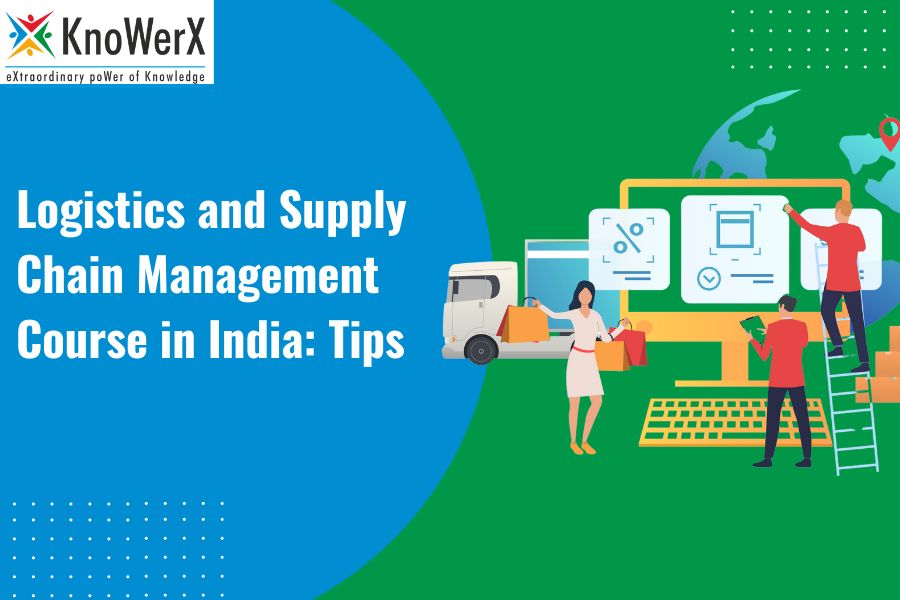
Choosing Logistics and Supply Chain Management Course in India: Essential Tips Embarking on a journey to boost your career in logistic and supply chain management in India is a big step. With so many options out there, picking the right course is crucial for your professional growth. At KnoWerX, a top-notch supply chain management training center, we get how important it is to choose the perfect program that matches your goals. To help you out, we’ve put together a detailed guide packed with useful tips and insights to guide you toward success in logistics and supply chain management courses in India. Define Your Career Goals Before you dive into looking at logistics and supply chain management courses in India, take a moment to think about where you want your career to go. Whether you’re interested in logistics, operations management, procurement, or supply chain analytics, having clear career goals will help you pick the right course. Research Course Content The most important part of any good logistics and supply chain management course in India is what they teach you. Take a close look at what each course covers. Make sure they include important topics like inventory management, transportation, warehousing, procurement strategies, and supply chain optimization to prepare you well for the industry. Check Accreditation and Certification Accreditation and certification are signs that a logistics and supply chain management course in India meets high standards. Look for programs that are accredited by respected institutions or industry bodies. Also, consider courses that offer recognized certifications when you finish, as this can boost your credibility and career prospects. Evaluate Faculty Expertise The quality of the instructors makes a big difference in how useful a logistics and supply chain management course is. Look into the backgrounds of the teachers. Check out their experience in the industry, their academic qualifications, and how respected they are in the field. Learning from experienced professionals can give you valuable insights and practical knowledge. Assess Learning Methods It’s important to choose a logistics and supply chain management course in India that fits your learning style and schedule. Whether you prefer traditional classroom learning, online modules, a mix of both, or interactive workshops, make sure the course offers flexibility without compromising quality. Practical exercises like case studies, simulations, and real-world projects can enhance your skills effectively. Consider Industry Connections Building connections with the industry is crucial during your logistics and supply chain management course in India. Look for programs that offer opportunities to collaborate with top companies, provide internships, or bring in guest speakers from the industry. Networking with professionals can boost your career prospects and open doors to exciting opportunities in supply chain management. Compare Reviews and Testimonials Listening to what past students have to say can give you valuable insights into logistics and supply chain management courses in India. Reach out to former participants and alumni to learn about their experiences. Online reviews, testimonials, and alumni networks are great resources for getting different perspectives on course content, faculty support, and the overall learning environment. FAQs: Frequently Asked Questions Q1. Why is it important to define career goals before choosing a logistics and supply chain management course? Defining your career goals helps in aligning the course curriculum with your aspirations, ensuring you choose a program that suits your professional objectives. Q2. How can I verify the quality of a logistics and supply chain management course in India? Look for accreditation from respected institutions or industry bodies, as well as recognized certifications upon completion, which enhance your credibility and career prospects. Q3. How does KnoWerX differentiate itself in the logistics and supply chain management education landscape? KnoWerX offers top-notch courses, including highly respected APICS Courses, with a commitment to quality education and industry relevance, providing students with the opportunity to excel in India’s dynamic logistics and supply chain management field. End Notes In wrapping up, when you’re looking at logistics and supply chain management courses in India, it’s important to think carefully and weigh your options. With KnoWerX by your side, you’re setting off on a journey of education that can really make a difference. Choose wisely, put your resources into something that will benefit your future, and open up a world of possibilities with KnoWerX’s top-notch courses, including the highly respected APICS Courses. With our know-how and commitment, you have the chance to boost your skills and take the lead in India’s ever-changing logistics and supply chain management field. Top of Form Image Reference: Freepik Disclaimer: All trademarks, logos, and brand names are the property of their respective owners. All company, product, and service names used in this website are for identification purposes only. Use of these names, trademarks, and brands does not imply endorsement.
Reasons to Get Demand Planning and Forecasting Certification
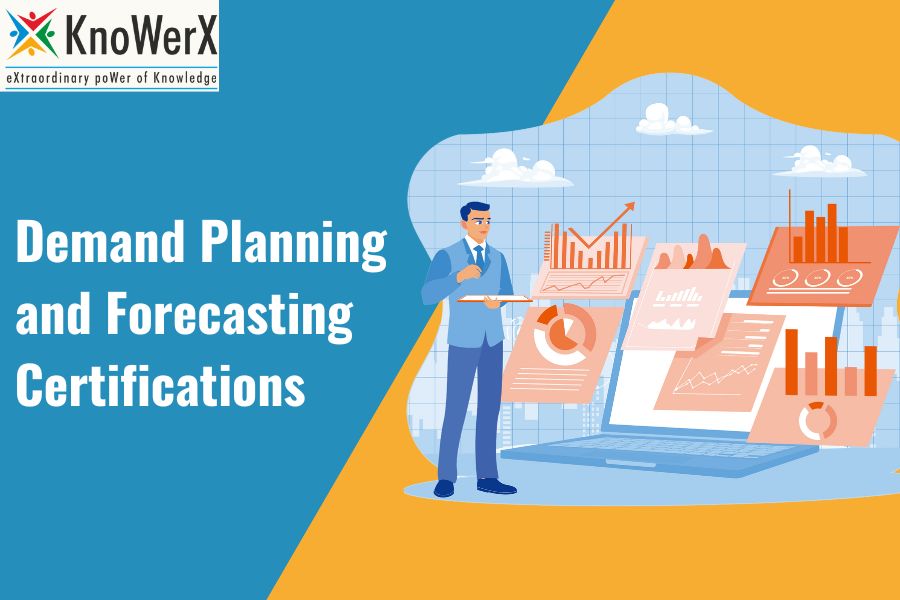
Demand Planning and Forecasting Certification: Essential Tips for Success In the realm of supply chain management, demand planning and forecasting stand as essential pillars, dictating the rhythm of inventory management, production scheduling, and overall business strategy. This helps companies manage their stock, plan when to make things, and decide on their overall business strategy. Nowadays, things change fast. People’s tastes can shift, and big events around the world can mess up supply chains in no time. That’s why it’s so important to have experts who can predict demand and plan accordingly. At KnoWerX, we know how crucial it is to be good at this stuff. That’s why we’re here to help people like you get really good at forecasting and planning. We’ve got tons of experience and we’re committed to giving you the best education possible, so you can ace demand planning and forecasting certification. Understanding the Fundamentals Before you start your journey towards demand planning and forecasting certification, it’s important to have a good grasp of the fundamentals. Things like how demand changes, analyzing how long it takes to get products, managing extra stock for emergencies, and different ways to predict future demand are the building blocks of this field. Once you understand these basics well, you’ll have a solid foundation to learn more advanced stuff. KnoWerX’s training programs are designed by experts to help you understand these important concepts clearly and feel sure about them.Top of Form Stay Updated with Industry Trends The landscape of demand planning and forecasting is constantly evolving. This is because of new technology, how people buy stuff, and what’s happening in the world economy. If you’re getting certified, it’s super important to keep up with all these changes so you can keep up with everyone else in the field. One way to do this is by reading industry magazines, joining online talks, and going to events where you can meet others in the same business. When you show that you’re always learning, you not only get smarter but also show that you’re someone who’s always looking ahead. Hands-on Practice Theory alone can only take you so far. To truly master demand planning and forecasting Certification, you must immerse yourself in practical application. Seek out opportunities to apply your knowledge through real-world scenarios, such as case studies, simulation exercises, and collaborative projects. By engaging in hands-on practice, you develop a deeper understanding of the complexities involved and sharpen your problem-solving skills. KnoWerX provides a supportive environment where you can gain invaluable practical experience under the guidance of industry experts. Utilize Resources Wisely In your quest for demand planning and forecasting certification, make the most of the resources you have available. You’ve got plenty to choose from: textbooks, online courses, specialized software, and networking with professionals in the field. Use all these tools to learn more and improve your skills. And if you need help, don’t be afraid to ask your teachers, mentors, or peers. At KnoWerX, we’re all about giving you everything you need to succeed in getting certified, such as our Certified Forecasting and Demand Manager (CFDM) certification. Prepare Strategically for Certification Preparing for demand planning and forecasting certification takes some careful thought and planning. You want to make sure you’re ready for it. So, start by creating a study plan that lays out what you need to cover and how much time you’ll need. Make sure to give yourself enough time to go over the course materials, practice solving problems, and take practice tests. It’s also a good idea to figure out where you’re strong and where you could use some work early on. That way, you can focus your efforts where they’ll make the most difference. Being organized and disciplined about your preparation will give you the best shot at passing the certification exams. One certification you might be interested in is the Certified Forecasting and Demand Manager (CFDM) certification offered by KnoWerX. We have training programs tailored specifically for this kind of certification. They’re designed to help you through the whole process, giving you the tools and support you need to do your best. Unlocking Opportunities with Certification When you earn demand planning and forecasting certification, you’re opening doors to lots of chances to grow and move up in your career. Maybe you want to improve your job options, make more money, or learn new things – certification shows you know your stuff and are serious about doing a great job. Lots of companies are looking for people with these skills, so if you’re certified, you’ll be in demand all over the world. At KnoWerX, we’re here to help you make the most of these opportunities and reach your career goals. FAQs: Frequently Asked Questions Q1. What is the importance of demand planning and forecasting in supply chain management? Demand planning and forecasting are crucial pillars in supply chain management, influencing inventory management, production scheduling, and overall business strategy. They enable companies to anticipate demand shifts, manage stock effectively, and align production with market needs. Q2. Why is it important to be proficient in demand planning and forecasting? In today’s fast-paced business environment, rapid changes in consumer preferences and global events can disrupt supply chains. Proficiency in demand planning and forecasting allows professionals to predict demand accurately and make informed decisions, ensuring smooth operations and strategic success. Q3. What certification options are available for demand planning and forecasting? One prominent certification is the Certified Forecasting and Demand Manager (CFDM) certification offered by KnoWerX. This certification program is tailored to equip professionals with the necessary knowledge and skills to excel in demand planning and forecasting. End Notes In summary, KnoWerX’s Certified Forecasting and Demand Manager (CFDM) certification can help you become a recognized expert in demand planning and forecasting. By learning the basics well, keeping up with what’s happening in the industry, getting hands-on experience, and working well with others, you can reach your full potential and excel in getting certified. With hard work, always learning, and being good at
Steps to Get an Integrated Business Planning Certification
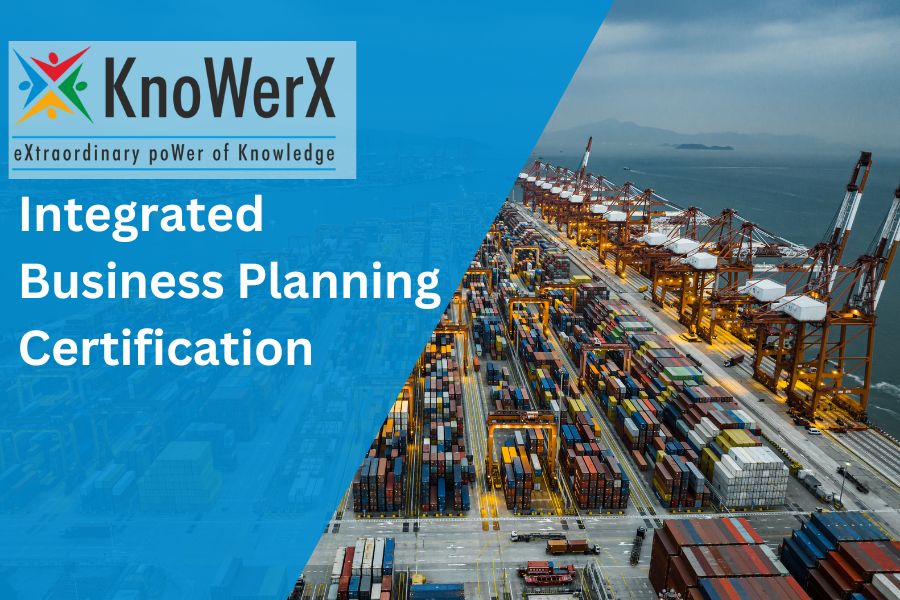
Tips for Successfully Obtaining an Integrated Business Planning Certification As the global business landscape becomes more complex and interconnected, organizations are realizing the need for a holistic approach to planning that encompasses all aspects of their operations. IBP provides a framework for integrating strategic, financial, and operational plans, ensuring alignment across the entire organization. Professionals who are certified in IBP are equipped with the skills and knowledge needed to drive this crucial process and help their organizations achieve sustainable growth and competitive advantage. With KnoWerX’s Integrated Business Planning Certification program, participants not only gain valuable insights into the principles of IBP but also learn how to apply them in real-world scenarios, making them invaluable assets to their organizations. Understand the Fundamentals of IBP Before pursuing an Integrated Business Planning Certification, it’s essential to have a solid understanding of the fundamentals of Integrated Business Planning. Familiarize yourself with key concepts such as demand planning, supply planning, inventory management, and sales and operations planning (S&OP). This foundational knowledge will provide you with a strong basis for the certification program that will help your grow. Choose the Right Certification Program Selecting the right certification program is crucial for your professional development. Look for a program that is recognized in the industry and covers all aspects of IBP comprehensively. KnoWerX’s Integrated Business Planning Certification program is designed by industry experts and offers practical insights and real-world case studies to enhance your learning experience. With KnoWerX, participants not only gain theoretical knowledge but also benefit from hands-on learning, ensuring they are well-equipped to apply IBP principles effectively in their careers. Prepare Thoroughly for the Certification Exam Proper preparation is key to passing the Integrated Business Planning Certification exam. Review the exam syllabus and study materials provided by KnoWerX to ensure you are familiar with the content. Take advantage of practice exams to assess your knowledge and identify areas for improvement. Additionally, consider joining study groups or seeking guidance from experienced professionals to gain valuable insights and tips for exam success. Remember, a well-rounded preparation strategy will not only help you pass the exam but also enhance your understanding of IBP principles for practical application in your career. Gain Practical Experience To truly excel in IBP, it’s essential to gain practical experience in the field. Look for opportunities to apply your knowledge in real-world scenarios, either through work projects, internships, or volunteering in relevant organizations. This hands-on experience will not only enhance your understanding of IBP but also make you a more valuable asset to employers. Additionally, consider seeking mentorship from experienced professionals in the field, as their guidance can provide valuable insights and help you navigate complex IBP challenges more effectively. Stay Updated with Industry Trends The field of Integrated Business Planning is constantly evolving, with new trends and technologies emerging regularly. Stay updated with the latest industry developments by attending conferences, webinars, and networking events. FAQ: Frequently Asked Questions Q: What is Integrated Business Planning (IBP), and why is it important? A: Integrated Business Planning (IBP) is a framework that aligns strategic, financial, and operational plans for sustainable growth. IBP Certification helps professionals drive this process, enhancing organizational alignment and decision-making. Q: How can professionals prepare for the Integrated Business Planning Certification exam? A: Professionals can prepare for the Integrated Business Planning Certification exam by familiarizing themselves with the exam syllabus, studying relevant materials, and taking practice exams to assess their knowledge and identify areas for improvement. Q: What role does practical experience play in excelling in IBP? A: Practical experience is crucial for excelling in IBP, as it allows professionals to apply theoretical knowledge in real-world scenarios, gaining a deeper understanding of the framework and becoming more valuable assets to their organizations. End Notes Integrated Business Planning (IBP) is a crucial framework for organizations looking to achieve sustainable growth and competitive advantage in today’s complex business environment. Professionals certified in IBP play a vital role in aligning strategic, financial, and operational plans across the organization. With KnoWerX’s Integrated Business Planning Certification program, participants not only gain a deep understanding of IBP principles but also learn how to apply them effectively in real-world scenarios. By choosing KnoWerX’s recognized program, aspiring professionals can prepare thoroughly for the certification exam and gain practical experience to become invaluable assets to their organizations. Additionally, staying updated with industry trends and developments is essential. Image Reference: Freepik Disclaimer: All trademarks, logos, and brand names are the property of their respective owners. All company, product, and service names used in this website are for identification purposes only. Use of these names, trademarks, and brands does not imply endorsement.
Excelling in Supply Chain Risk Management Certification
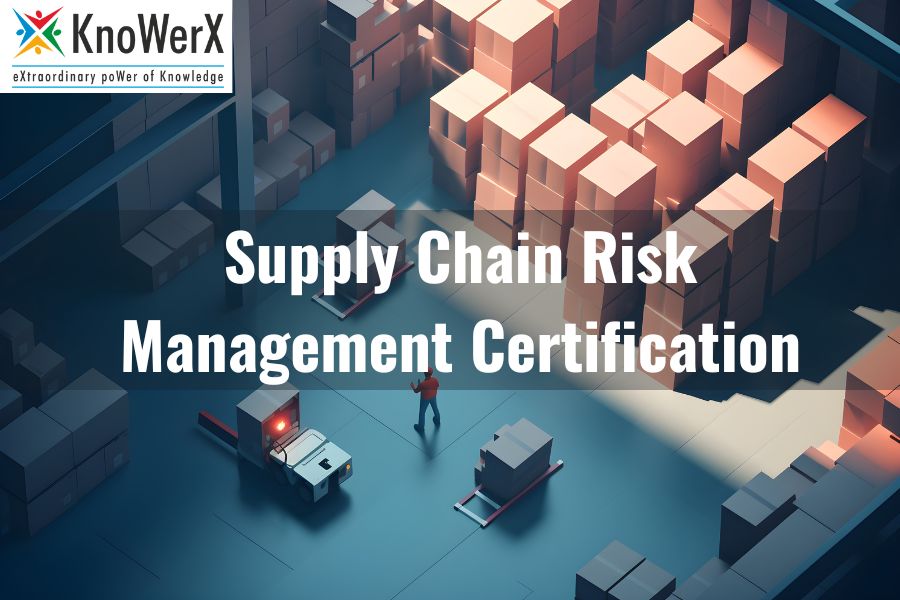
Excelling in Supply Chain Risk Management Certification: Essential Tips In today’s complicated business world, getting supply chain risk management certification is really important for people working in all kinds of industries. As supply chains spread out across the globe and become more connected, it’s crucial to be able to spot, understand, and deal with risks. This helps keep things running smoothly and without interruptions. At KnoWerX, we understand how vital it is to give people the knowledge and skills they need to handle these challenges well. Our trainers have more than 75 years of experience in teaching and advising. They’re committed to offering excellent training courses that help professionals succeed and do their best. Understanding the Fundamentals Before you start working towards getting supply chain risk management certification, it’s important to build a strong base by really understanding the basics of the subject. This means getting to grips with important ideas like spotting risks, evaluating them, figuring out how to deal with them, and keeping an eye on them. At KnoWerX, we’ve put a lot of effort into creating training courses that cover these fundamental concepts really well. We use interactive classes and real-life examples to make sure that people learn what they need to know to handle the challenges of supply chain risk management confidently. Staying Updated with Industry Trends The world of supply chain management is always changing. Risks keep popping up because of things like more global trade, new technology, and what’s happening in different countries. To make sure we’re ready for whatever comes our way, it’s super important to keep learning about what’s going on in the industry. At KnoWerX, we are committed to keeping our training programs relevant and up-to-date with the rapidly changing landscape of supply chain risk management certification. Our trainers are experts with tons of experience in the field. They’ll teach you about the latest challenges, trends, and the best ways to handle tough situations. So when you finish our program, you’ll be ready to tackle anything in the real world. Embracing a Holistic Approach Taking a big-picture approach is key to managing risks in the supply chain effectively. Imagine the supply chain like a web, where one issue in one area can cause problems in others. So, it’s crucial to have plans that cover all the bases. Our training programs emphasize the importance of taking a holistic view of supply chain risk management certification, guiding participants through the process of developing integrated risk management frameworks. This helps businesses stay strong even when things get uncertain. Practising Risk Assessment Techniques To get good at spotting and ranking supply chain risks, you need to master risk assessment techniques. Whether you’re using simple descriptions or numbers, grids to map out risks, or imagining different scenarios, it’s important to be skilled at sizing up risks accurately. At KnoWerX, we give participants the chance to practice assessing risks by doing hands-on activities and simulated tasks. By trying out these techniques in a pretend setting, learners get a feel for how tricky it can be to manage supply chain risks. They also learn the skills in supply chain risk management certification which helps people to make smart choices when real problems come up. Collaborating and Communicating Effectively Collaborating and communicating well is super important for making sure supply chains run smoothly and don’t get messed up by unexpected problems. Since supply chains involve lots of different people and companies working together, it’s really important to talk to each other and work together effectively to manage any risks that might come up. Our training programs don’t just teach technical stuff; they also help people get better at talking to each other and working as a team. We use things like interactive workshops and role-playing games to show people how to share information about risks, get everyone involved, and work together closely throughout the supply chain. FAQs: Frequently Asked Questions Q1. Why is supply chain risk management certification important? Supply chain risk management certification is crucial in today’s business world due to the increasing complexity and interconnectedness of supply chains globally. Certification equips professionals with the knowledge and skills needed to identify, understand, and mitigate risks, ensuring smooth operations without interruptions. Q2. What is the holistic approach to supply chain risk management? A holistic approach involves considering the entire supply chain ecosystem rather than isolated components. KnoWerX emphasizes the importance of developing integrated risk management frameworks to address potential risks comprehensively. Q3. How does KnoWerX help participants practice risk assessment techniques? KnoWerX offers hands-on activities and simulated tasks to allow participants to practice assessing risks effectively. Through these exercises, learners gain practical experience and develop skills essential for making informed decisions in real-world situations. End Notes To sum up, Getting supply chain risk management certification means grasping the basics, keeping up with what’s happening in the industry, looking at the big picture, using risk assessment methods, and working well with others. At KnoWerX, we’re dedicated to giving you the know-how, abilities, and resources to thrive in the ever-changing world of supply chain risk management. Our experienced trainers and top-notch training courses will set you on the path to certification with assurance, helping you thrive in today’s intricate business world. Image Reference: Freepik Disclaimer: All trademarks, logos, and brand names are the property of their respective owners. All company, product, and service names used in this website are for identification purposes only. Use of these names, trademarks, and brands does not imply endorsement.
ASCM Certification: Your Path to Supply Chain Expertise
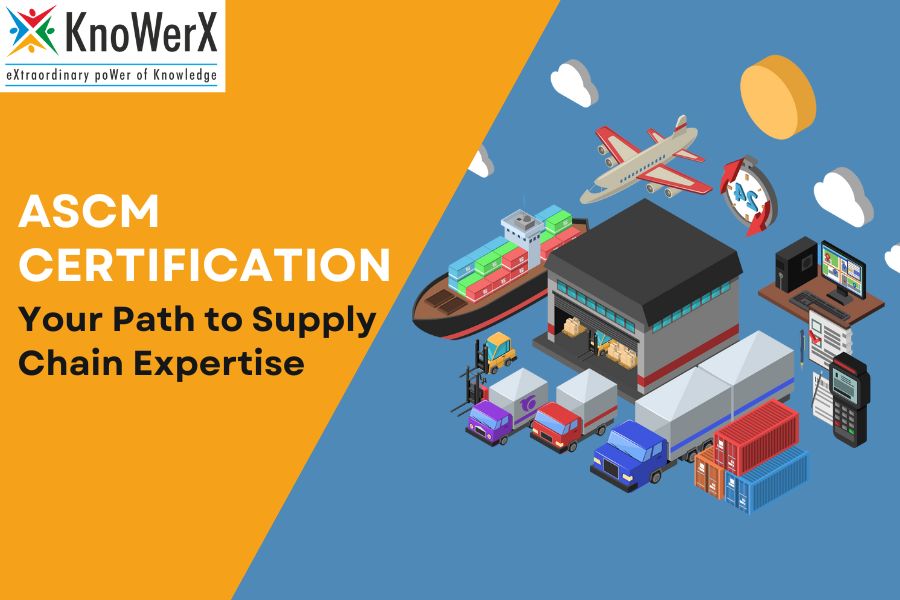
ASCM Certification: Your Path to Supply Chain Expertise In the ever-changing world of business today, how companies handle their supply chains is super important for their success. They’re always looking for ways to make things run better, spend less money, and do things more efficiently. That’s where supply chain management comes in. It’s all about making sure everything from getting raw materials to delivering finished products happens smoothly. And guess what? People who know how to do this well are really wanted by companies. One way to show you know your stuff in supply chain management is by getting certified. The Association for Supply Chain Management (ASCM) gives out certifications that prove you’re skilled in this area. In this article, we’re going to talk all about these certifications. We’ll give you the lowdown on what they are, why they matter, and how you can get started on the path to becoming a supply chain management pro. Understanding ASCM Certification ASCM certification is all about showing that you’re really good at supply chain management. Earlier known as APICS, and now ASCM, have four certifications, viz. Certified Supply Chain Professional (CSCP), Certified in Planning and Inventory Management (CPIM), Certified in Logistics Transportation and distribution (CLTD) and Certified in Transformation for Supply chain (CTSC) which focus on different parts of managing the supply chain. Benefits of ASCM Certification The benefits of getting an ASCM certification are pretty great. First off, it boosts your credibility and makes you more attractive to employers, showing that you’re serious about growing in your field. Plus, these certifications are known worldwide, so you can snag job opportunities both at home and abroad. And here’s a big one: certified people tend to earn more and move up the career ladder faster than those without certification. On top of that, going through the ASCM certification process gives you the smarts and abilities to handle actual supply chain problems, which can make you super valuable to any company. Choosing the Right Certification Selecting the right ASCM certification is really important if you want to match up your career goals with where you want to go professionally. The CSCP certification is great if you want to get a solid grasp of supply chain management overall. It covers a bunch of stuff like logistics, operations, buying things, and planning strategically. But if you’re more into production and keeping track of inventory, then the CPIM certification is for you. It’s perfect for folks working in manufacturing, operations, or keeping tabs on inventory. When you’re trying to decide between CSCP and CPIM or any other certifications, think about where you’re headed in your career, what you’re doing now at work, and what you’re personally interested in Preparing Effectively Preparing effectively is crucial for doing well in ASCM certification exams. First, get to know what’s on the exam and figure out where you might need extra help. Use different study tools like textbooks, online courses, practice tests, and study groups to really understand the important stuff. Make a study plan that works with your schedule and gives you enough time to review and practice. You might also want to think about joining a good training program, like the ones from KnoWerX, where you can learn from experts and get hands-on experience. And stick to your plan – make sure to study a bit every day. Staying Updated The world of supply chain management is always changing, pushed by new technology, shifting customer needs, and worldwide economic shifts. To keep up and stay ahead, make sure you’re always learning and growing in your career. Take part in workshops, seminars, webinars, and conferences to keep learning and connect with others in the field. Also, use online tools, industry magazines, and professional groups to stay in the loop about what’s new, what works best, and any rules that are changing in supply chain management. FAQs: Frequently Asked Questions Q1. What is ASCM certification? ASCM certification, formerly known as APICS, offers certifications that demonstrate proficiency in supply chain management. These certifications include Certified Supply Chain Professional (CSCP), Certified in Planning and Inventory Management (CPIM), Certified in Logistics Transportation and Distribution (CLTD), and Certified in Transformation for Supply Chain (CTSC). Q2. Why is ASCM certification important? ASCM certification enhances credibility, making professionals more attractive to employers. It is recognized globally, opening up job opportunities domestically and internationally. Certified individuals typically earn higher salaries and advance quicker in their careers. Additionally, the certification process equips individuals with practical skills to tackle real-world supply chain challenges. Q3. What are the benefits of ASCM certification for career advancement? ASCM certification enhances credibility, increases employability, and often leads to higher salaries and faster career progression. It equips individuals with practical skills to address real-world supply chain challenges, making them valuable assets to employers. Additionally, ASCM certifications are globally recognized, broadening job opportunities both domestically and internationally. End Notes In wrapping up, ASCM certification is a valuable tool for people aiming to move forward in supply chain management careers. By grasping the ins and outs of ASCM certification, picking the right certification track, preparing well, and keeping up with industry changes, you can set yourself up for success in this exciting field. Here at KnoWerX, we’re dedicated to helping professionals like yourself reach your career goals through our thorough training programs and top-notch resources. Whether you’re going for CSCP, CPIM,CTSC, or other ASCM certifications, we’re here to guide you every step of the way as you strive for excellence in supply chain management.
Supply Chain Management Courses India
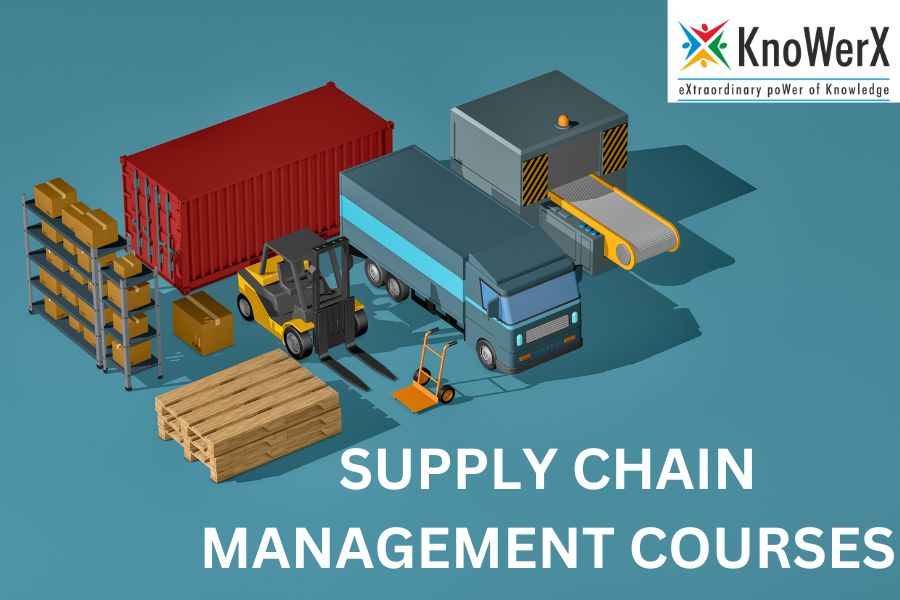
Navigating Supply Chain Management Courses in India: Opportunities, Careers, and Costs Over the past few years, businesses in India have seen big changes. This shift has been driven by things like companies going global, new technology, and what people want to buy. One big part of this change is Supply Chain Management (SCM). SCM is all about making sure things get from where they start, like raw materials, to where they’re needed, like the end customer. In this article, we’ll talk about why SCM is so important for businesses in India and look at the many courses available to help people learn the skills they need to work in this fast-changing field. These courses are known as Supply Chain Management Courses. What Is Supply Chain Management Course? Understanding Supply Chain Management Courses Supply Chain Management Courses cover a wide range of topics aimed at helping us understand, improve, and oversee the connected activities involved in getting products and services to customers. These courses typically cover areas like buying, shipping, keeping track of inventory, predicting demand, managing relationships with suppliers, and integrating sustainable practices into the supply chain. In India, there are many options for studying Supply Chain Management Courses. These courses are available at universities, colleges, specialized training centers, and online platforms. They cater to people at different points in their careers, whether they’re just starting out, already working, or executives looking to boost their skills in Supply Chain Management. Why Supply Chain Management Education Matters In today’s fiercely competitive business world, having a strong grasp of Supply Chain Management is crucial for companies to stay ahead, improve how they operate, and meet customer needs. As businesses work to make their supply chains more efficient, flexible, and resilient, there’s a growing need for professionals who have the specialized knowledge and skills in Supply Chain Management. Types Of Supply Chain Certifications Overview of Different Certifications: Certificate Programs: These are short-term courses designed to give you basic knowledge in Supply Chain Management (SCM). They cover important topics like procurement, keeping track of inventory, and managing logistics. Diploma Courses: These are more detailed than certificate programs. They dive deeper into SCM, giving you a better understanding and practical skills in different areas. Professional Certifications: These are like badges of expertise in SCM. Certifications like Certified Supply Chain Professional (CSCP) or Certified in Production and Inventory Management (CPIM) are recognized worldwide. They show you’ve got specialized knowledge in certain aspects of SCM. Postgraduate Degrees: These are advanced degrees like an MBA or PGDM, but with a focus on supply chain management. They not only teach you SCM concepts but also give you management skills to handle it effectively. Comparison of Certification Programs and Their Focus Areas: Curriculum: Each certification program might focus on different parts of SCM. Some might concentrate on procurement, others on logistics, demand forecasting, or even sustainability. Duration and Format: The length of these programs can vary a lot. Some might only take a few weeks, while others could last for months or even years. They might be offered online, in a classroom, or a mix of both. Accreditation and Recognition: It’s really important to pick certifications from respected institutions or professional bodies. That way, you know they’re recognized by industry leaders and employers. In short, when exploring Supply Chain Management Courses, consider what kind of certification suits your needs best, and make sure it’s recognized by the industry. Why Supply Chain Management Course? Benefits of Enrolling in a Supply Chain Management Course: Skill Improvement: Supply Chain Management Courses help individuals develop practical skills and knowledge essential for streamlining supply chain operations, cutting costs, and boosting effectiveness. Industry-Relevant Education: The curriculum of Supply Chain Management Courses stays updated with industry trends, ensuring learners acquire current knowledge and skills sought after by employers. Career Growth: Obtaining certification or a degree in Supply Chain Management opens up various job opportunities across industries like manufacturing, retail, e-commerce, and consulting, enhancing career prospects. Global Reach: As supply chains expand globally, professionals proficient in Supply Chain Management find opportunities for international career advancement and mobility. How Supply Chain Management Education Improves Career Opportunities and Industry Relevance: Specialized Knowledge: Supply Chain Management Courses delve into areas such as inventory management, procurement strategies, supply chain analytics, and sustainable practices, making graduates highly desirable to employers. Networking Possibilities: Enrolling in Supply Chain Management Courses offers chances to connect with industry experts, professionals, and alumni, facilitating networking and career advancement. Leadership Growth: Advanced Supply Chain Management programs emphasize leadership and strategic management skills, preparing individuals for managerial and leadership roles within supply chain organizations. Adaptability and Resilience: In today’s fast-paced business world, Supply Chain Management education equips professionals with the flexibility and resilience needed to navigate disruptions, manage risks, and foster innovation within supply chains. Why Supply Chain Management As A Career? Exploring the Rising Demand for Supply Chain Professionals in India: Rapid Economic Growth: India’s economy is booming, which means supply chains are getting more complicated. That’s where skilled professionals come in handy, making sure everything runs smoothly. Globalization: Indian companies are going global, and international firms are setting up shop in India. This expansion means there’s a big demand for experts who can handle the complexities of global supply chains. Technological Advancements: Fancy tech like AI, IoT, and blockchain are changing how supply chains work. To keep up, we need professionals who know their way around these tools. Discussing the Wide Range of Career Opportunities in SCM: Logistics Management: Think of it as the traffic controller of supply chains. You make sure everything gets from point A to point B on time, whether it’s by truck, train, or plane. Procurement: You’re the one who finds the best deals for the materials a company needs. It involves negotiating contracts and keeping good relationships with suppliers. Inventory Management: It’s all about finding that sweet spot between having enough stuff in stock and not having too much. You keep track of inventory levels to save costs while still meeting demand.
Certified Warehouse management professional (CWMP)
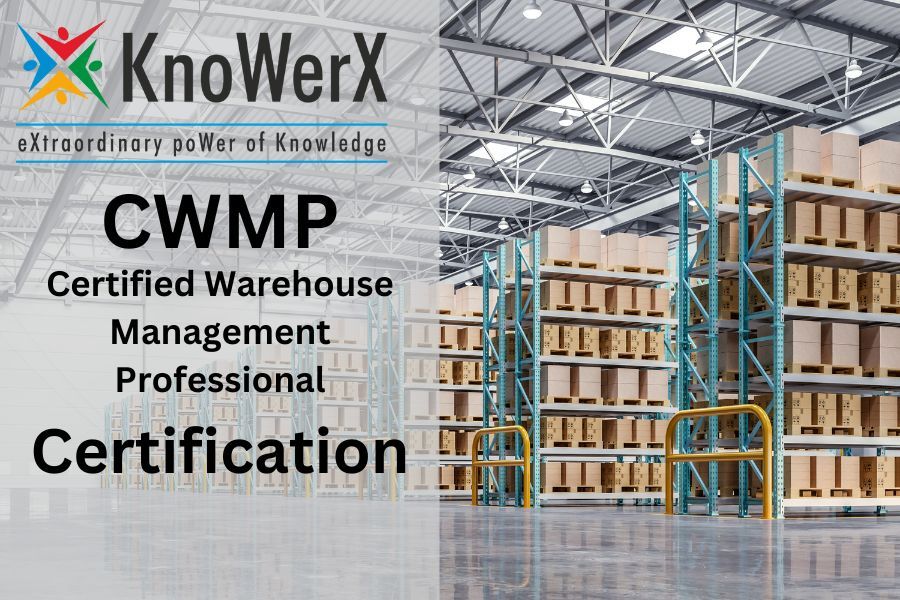
CWMP (Certified Warehouse Management Professional) Certification: A Pathway to Success in Warehouse Management In the world of logistics and supply chain operations, managing warehouses is crucial. Warehouses are dynamic places where efficiency is key, and it takes skilled professionals to keep things running smoothly. At KnoWerX, we understand just how important warehouse management is for keeping everything in order. That’s why we’ve created the Certified Warehouse Management Professional (CWMP) program. Let’s talk about what CWMP is all about and why it matters so much in our industry What is a Certified Warehouse Management Professional (CWMP)? The Certified Warehouse Management Professional (CWMP) program by KnoWerX equips individuals with vital skills and knowledge crucial for excelling in warehouse management roles. Covering a broad spectrum of topics such as inventory control, order fulfillment, warehouse layout optimization, transportation management, and risk mitigation strategies, our certification program ensures comprehensive preparation for effective warehouse operations. To get certified, you usually go through training or study materials that cover everything from how to keep track of inventory to organizing the layout of a warehouse efficiently. After that, you have to pass a tough exam given by official certifying bodies. Now, why bother getting CWMP certified? Well, here are some good reasons: Better Job Opportunities: Having CWMP certification opens up more doors for jobs in warehouse management. Employers often prefer hiring people who have proven they know what they’re doing. More Credibility: When you’re CWMP certified, it’s like having a stamp of approval on your resume. It shows that you’re serious about your job and that you’ve put in the effort to learn the ins and outs of warehouse management. Improved Performance: The skills and knowledge you gain from CWMP training help you do your job better. That means you’re more efficient, productive, and better at keeping customers happy. Networking: Being part of the CWMP community means you get to connect with other professionals in the field. This can lead to valuable collaborations, sharing of ideas, and even new career opportunities. Higher Salary Potential: With CWMP certification, you might find yourself earning more than those without it. Companies are willing to pay more for professionals who bring certified expertise to the table. So, if you’re working in warehouse management or aiming to get into the field, getting Certified Warehouse Management Professional (CWMP) certified could be a smart move for your career. How To Learn Warehouse Management System? Traditional Training Programs: These are like the classic classroom-style teachings you might be familiar with. Places like vocational schools or community colleges offer comprehensive courses covering everything from basic principles to advanced technologies. You’ll learn about managing inventory, keeping things safe in the warehouse, and how to operate equipment. Plus, some programs even give you hands-on practice in simulated warehouse setups, which is super helpful. Online Courses and Certifications: If you prefer learning at your own pace or from the comfort of your home, online courses are fantastic. Websites like Coursera, Udemy, and LinkedIn Learning have loads of options, from beginner stuff to more advanced topics. And if you’re looking for something more official, there are certifications like the Certified Warehouse Management Professional (CWMP) from KnoWerX institution. These certifications show you’re skilled in things like controlling inventory and running warehouse operations smoothly. Get Real-world Experience: Sometimes, nothing beats rolling up your sleeves and getting hands-on. Internships or entry-level jobs in warehouses can give you that practical knowledge you can’t get from books alone. You’ll see how things really work, get comfortable with the software and tech used in the industry, and pick up important skills like problem-solving and communication. Some companies even have special training programs or mentors to help you climb the ladder in warehouse management. What Is The Scope Of Warehouse Management? Warehouse management is super important in the big picture of how stuff gets from point A to point B in the business world. It’s like the backstage crew of a theater production – they make sure everything runs smoothly so the show can go on. Here’s what you need to know: Warehouse Management’s Role in the Supply Chain: Imagine a huge puzzle where each piece represents a step in getting products to customers. Warehouse management is one of those crucial puzzle pieces. It’s all about making sure things get to the right place at the right time. Warehouse managers keep an eye on what’s in stock, figure out the best way to store things, and work with other teams like shipping and manufacturing to make sure everything flows smoothly. Career Opportunities in Warehouse Management: If you’re thinking about diving into warehouse management, there’s a whole bunch of paths you can take. You might start out doing basic tasks like organizing inventory or moving stuff around. As you get more experience, you can climb the ladder to jobs like managing a whole warehouse or even overseeing the whole operation. There are also specialized roles if you’re really into stuff like tracking inventory or planning logistics. Demand for Warehouse Managers: Think of it like this – as more and more businesses grow and sell stuff online, they need individuals who can keep their warehouses running like well-oiled machines. That means there’s a growing demand for people who know their way around warehouse management. Whether it’s retail, manufacturing, or shipping, there are plenty of places looking for skilled warehouse managers. What Qualifications Do I Need To Be A Warehouse Manager? Educational Requirements: While formal education requirements may vary depending on the employer and specific job roles, a bachelor’s degree in logistics, supply chain management, business administration, or a related field is often preferred. Employers also consider candidates with relevant associate degrees or Certifications in warehouse management. Skills and Abilities: Leadership: You’ll need to lead and motivate teams, delegate tasks, and create a positive work environment. Organization: Being able to arrange the layout of the warehouse, manage inventory systems, and streamline workflow is crucial. Analysis: Understanding data and trends helps in making decisions to improve warehouse operations. Communication: You’ll
